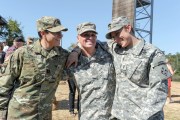This article first appeared on The War Horse, an award-winning nonprofit news organization educating the public on military service. Subscribe to their newsletter.
Content warning: This story contains depictions of sexual assault.
Leah Stiles kept a dark secret tucked in a pocket of her Navy uniform, something she knew could get her booted from the service.
In the end, it did.
In 2017, her ship, the aircraft carrier George H.W. Bush, was at war as part of a strike group that attacked Islamic State forces in Syria and Iraq.
For 15 years in uniform, she’d been at war with an eating disorder — a constant urge to purge her meals. She kept a toothbrush in her pocket to gag.
Stiles knew her condition would disqualify her from the Navy, and so did the most senior enlisted sailor on Bush, Command Master Chief Huben Phillips. But she was such a strong sailor, Phillips would later say, that throughout Stiles’ Navy career, leaders chose to believe her when she insisted she was better.
Before they set sail, Phillips had told Stiles, “There’s no purging on my ship,” she recalled.
She promised to comply.
Then, just after a special Sunday waffle breakfast in the Chiefs Mess, her ruse was over.
Drill sergeants — not therapy
Faced with the ultimate in fitness standards, men and women throughout the military obsess over their weight and body shapes, experts say. They are too often forced into silence in a system built around PT and drill sergeants — not therapy.
Now, as the military doubles down on readiness and projecting a “warrior ethos,” advocates fear that more service members will be struggling with — and hiding — eating disorders to avoid being medically discharged.
One study by the Defense Health Agency found the rate of diagnosed cases in the military nearly doubled during the five-year period ending in 2021. In that time, more than 2,400 active-duty service members were diagnosed with an eating disorder, with women diagnosed at more than eight times the rate of men. While official diagnosis rates are low, survey research suggests that up to 8 percent of women in the military may experience some form of eating disorder.
But the numbers are deceiving, the study said, because so many cases go unreported.
Like Leah Stiles’ did for so long.
‘These calories are going to get in my system’
She could feel him watching her, all throughout that special Sunday breakfast. So she loaded up her plate with waffles and whipped cream. When she noticed Phillips still peering her way, she tried to fool him by taking bites.
Phillips wasn’t buying her act.
“‘I want to see you in my office now,’” she remembers he said.
Stiles didn’t think this meeting would be about breakfast, though. Instead, she told herself that she must have forgotten one of her duties as a senior mass communication specialist. When Phillips began walking to his office, Stiles took a detour on the way. She had to.
“There’s only one bathroom with a single stall,” she later said, “and I was walking by that one, and I [thought], ‘Oh, God. So, if I go to his office and he talks forever, this waffle, these calories are going to get in my system. This sugar is going to get in my system. I can’t risk going to his office and him talking too long, and these calories absorbing inside of me.’”
So she ducked into the head, pulled out the toothbrush, and lodged it to the back of her throat.
She’d been regularly performing a similar purging routine since she was a teenager. At one point, she’d ruptured her esophagus. So, she resorted to using the rounded rubber end of a toothbrush instead of her finger to make herself gag.
She cleaned her face and wiped down everything before heading to Phillips’ office.
As she climbed the stairs to walk down the p-way, she felt lightheaded and nearly passed out in front of his door. As her legs wobbled, her fellow sailors hurried over to try to help. Once she got herself together, she entered the office and knew right away: This was trouble.
“I could tell he was angry,” Stiles said. “I was trying to focus on not passing out.”
That’s when the commanding officer ordered her to empty her pockets.
(ANJA SLIBAR FOR THE 19TH)
‘We will be FIT, not FAT’
In his first days back in the White House, President Donald Trump issued an Executive Order Prioritizing Military Excellence and Readiness, urging commanders to evict troops unable to “deploy, fight, and win, including in austere conditions … without the benefit of routine medical treatment or special provisions.”
The focus of the order targeted transgender troops. But it also listed mental and physical health conditions, including eating disorders, that long-standing Department of Defense policy found “incompatible with active duty.”
Trump’s order for the military to focus on a “warrior ethos” has led to stricter combat fitness standards and frequent photo ops of Defense Secretary Pete Hegseth training with the troops.
“REAL fitness & weight standards are here,” Hegseth posted on X in response to a headline that two-thirds of reserve troops are overweight. “We will be FIT, not FAT.’’
In July, the Pentagon added a number of physical and mental issues, including vision and heart problems, to the list of conditions that disqualify someone from military service. But long before Trump became commander in chief, eating disorders, including anorexia nervosa and bulimia, occurring after the age of 13 have been on the list.
The policy still left room for recruits and members of the armed forces like Stiles to stay silent and serve: To get into the military, a history of treatment for a mental condition depends solely on self-reporting.
Nobody needed to know.
Saliva and acid still there
After years of desperately hiding her illness, Stiles pulled out the toothbrush and placed it on Phillips’ desk. She remembers the “saliva and acid and all that [still] on there.”
That toothbrush would become a key piece of evidence in the command triad’s decision to boot her from the ship — and essentially the end of her Navy career. She spent the next two years in and out of treatment and spent another two years navigating through the medical retirement process.
Phillips knew the value Stiles’ “exceptional work ethic” brought to the command team, but he also knew his responsibility was to ensure that his chiefs were mentally, physically and spiritually prepared to lead their teams and defend their ship. He explained that the relationships within the Chiefs Mess — regarded as the most esteemed fraternity within the Navy — must be genuine, supportive and reliable.
“Yeah, you’re done,” Stiles remembered Phillips telling her. “This is out of control, and I’m done giving you chances.”
Forced off the ship and force fed
Stiles remembers the humiliation walking past her peers in the chief petty officers’ mess — coined the “Goat Locker” in the Navy. As she strode down the ship’s passageway, she realized her mission was over and she was bound for the USS Bush’s homeport of Norfolk, Virginia.
“I absolutely felt useless and terrible,” Stiles, 46, told The War Horse.
She had been harboring this secret for so long, but instead of feeling relief, all she could think about was the damage to her career, and how they would take her away from her family, force her into a treatment facility, and force-feed her through an NG tube.
Phillips did not take the decision lightly, but he admitted he was relieved when they finally medevaced her off the ship. “Her long-term health took precedence over everything else,” he told The War Horse during a recent interview.
“Once I chose to inform the commanding and executive officer, there was no turning back,” he said. “Before she left the ship, I was confident that letting her go would save her life, and I felt at peace with my decision. Leah felt betrayed, but I believe we did the right thing.”
Looking back eight years later, Stiles admits the decision likely saved her life. But she worries that the military’s new, tougher tone on eating disorders will discourage today’s service members from taking the steps that may save theirs.
-
Read Next:
Stop commenting on people’s bodies
There is no shortage of headlines about alarming numbers of soldiers, sailors, airmen, coasties and Marines being overweight. And there is also no secret about the many unhealthy ways service members use to “make weight.”
Navy Mass Communication Spc. 1st Class Kristen Yarber, one of Stiles’ former shipmates, said it’s common knowledge that extreme fasting, calorie restriction, dehydration, taking laxatives and sweating are just a few methods service members will resort to before twice-a-year weigh-ins.
“It’s hard to recover from body dysmorphia or any eating disorder when the symptoms are celebrated by your coworkers and the environment you work in encourages disordered eating habits,” Yarber told The War Horse. “I’ve stopped commenting on people’s bodies and weight altogether. And I try to encourage my sailors to love their bodies and reach out if they need help.”
In an email response to questions about how the military monitors for eating disorders while upholding strict fitness requirements, officials from the Defense Health Agency insisted that, “First and foremost, the health and well-being of the military service member is of utmost importance. A medically ready force is key.”
But they say the purpose of body composition and fitness standards are to ensure that service members stand at maximum readiness at all times as U.S. forces must be available to deploy at a moment’s notice in support of the mission.
“Unfit service members cannot deploy, which impedes readiness and diminishes our capabilities,” DHA officials said in the email.

(ANJA SLIBAR FOR THE 19TH)
An ultimatum to stop hiding
Army Maj. Austin Otocki has a unique window into eating disorders in the military—not because he serves as administrative support to medical providers within the Defense Health Agency. But because of his own personal experience.
Growing up, he was heavier than his friends and the celebrities he admired like Freddie Prinze Jr.
Otocki said he learned to purge in college, initially as a way to manage alcohol intake. Gradually, the habit evolved into purging food and then into a way to maintain his weight.
It was sporadic early on, but it became more frequent and intense during periods of high stress while he was serving in the military, he said.
“One thing that a lot of folks going through … eating disorders are challenged with is anxiety,” he said. “A big piece of disordered eating is maintaining control.”
His wake-up call came in 2023, when his wife gave him an ultimatum after she discovered he was hiding something from her. He was ashamed to admit it and thought he must be the only male in the military who suffered from an eating disorder.
Until he connected with Leah Stiles.
He didn’t prefer skinny women
Stiles was 8 when the sexual abuse started. It spanned about four years until she ended up in foster care.
She remembers being about 12 when she overheard her stepfather talking on the phone, telling another firefighter how he didn’t prefer skinny women. She drew the conclusion in her mind that if she got skinny enough, he would no longer find her attractive.
Her diet grew so troubling that a foster family admitted her to Four Winds Hospital in Saratoga, New York, for an eating disorder.
The one thing that got her to eat an entire meal was the privilege of a phone call.
“I always wanted to be able to talk to my little brother,” she said.
A few years later, a fellow patient at a residential treatment facility taught her that just because she ate something, she didn’t have to keep it in her stomach.
That’s when Stiles learned to purge.
‘Fight not just with food’
Stiles joined the U.S. Navy never acknowledging that she was being treated for an eating disorder. She slid through the cracks because she was never skinny enough to be considered underweight and she didn’t have binging episodes.
“There wasn’t an actual diagnosis available for them to give me,” she said.
She met her husband, Marlando, in A School, where sailors learn the technical skills and knowledge required for their assigned rating after boot camp. But, he didn’t realize until a decade into their relationship that her behaviors around food and moments when she would emotionally shut down were cause for serious concern.
“I realized she was in a fight not just with food, but with herself, and that she needed support, not judgment,” Marlando told The War Horse.
A 21-year Navy veteran, Marlando said he had to unlearn his instinct to “fix” things and instead just be present, supportive, and willing to walk beside Stiles.
“The military prepares you for a lot of things,” he said, “but this wasn’t one of them.”

(Mate 3rd Class Sheryl Campbell/U.S. Navy)
‘If they didn’t intervene’
When Phillips confronted Stiles on the USS Bush, she sought absolute assurances that the intervention wouldn’t impact her career. He said he wasn’t able to provide that.
“As her leader, I recognized the imperative need to maintain transparency and inform her of the potential consequences of a service separation; as her friend and shipmate, I was acutely aware of the profound impact such an event would have on her and her family,” Phillips said. “Truth be told, I straddled the line with her. I left a door of hope open. Knowing Leah, I felt if I didn’t, she would intentionally fail treatment.”
Phillips, who spent 34 years in the Navy, serving as a hospital corpsman across multiple commands, said his medical background made him understand the losing battle Stiles was fighting. He thought he was doing the right thing by keeping close watch on her, requiring regular lab tests to check her potassium and electrolytes, but eventually realized she was hiding behind her big smile and relentless work ethic.
“Individuals with eating disorders,” he said, “cannot simply cease their behavior.”
It took Stiles’ medical evacuation for her to see how far she’d taken her disordered eating.
“I didn’t want to acknowledge any of it,” she said. “But I do believe that I might not have survived that deployment if they didn’t intervene.”
She realized that her senior enlisted officer had her back when he forced her off the aircraft carrier that April day in 2017 in the Persian Gulf.
“As soon as the ship pulled in from their deployment,” Stiles said, “one of the first places [Phillips] came was to see me … at the hospital.”
Starting a conversation
Stiles, who now lives in Florida outside Orlando, served 20 years before she was medically processed out of the military. But she fears the service members of today have little chance to see such success in their careers if they’re forced into silence.
“Labeling them as incompatible is not going to have us have less service members with eating disorders,” she said. “We’re just going to have less service members receiving treatment, and that’s far more dangerous.”
Stiles knew she needed to foster the conversation. So in 2023, she started SEA WAVES, a nonprofit organization for service members with eating disorders from across the military and veterans. The organization is now linked through Military OneSource’s resource finder.
“There’s not a lot of safe spaces, especially in the military community, to ask questions and have discussions about eating disorders,” Stiles said. “I want to make that available. I want these conversations to be had.”
It’s a conversation that led Otocki to finally get help.

(Courtesy Austin Otocki)
‘Monitoring it was the biggest thing’
After his wife confronted him, he finally decided to seek behavioral health treatment. He also discovered SEA WAVES and realized he wasn’t the only man in uniform struggling with disordered eating.
“Just being able to go to my [primary care] provider and open up about it allowed me to start getting resources,” Otocki said. “Monitoring it was the biggest thing because I think if I wasn’t seeking out care or addressing it, it probably would have continued on.”
He said he believes the stigma around behavioral health in the military is silencing service members more than the services’ lack of resources to treat patients.
“I don’t know a person in this profession that isn’t going to do everything within their power to take care of a soldier, an airman, a sailor,” Otocki told The War Horse. “The headache there, though, is we can treat what we see.”
Otocki said he believes that if military leaders received simple training on the warning signs of eating disorders, more service members could get help before the problem interferes with their job.
“It’s worth asking a question the same way that we do a really good job addressing things like suicide awareness,” Otocki said.
There is no way to clearly measure whether Trump’s executive order and Hegseth’s push for stricter fitness standards will lead to higher rates of eating disorders in the military. But it has led at least one service member to pause his own treatment so he isn’t singled out: Otocki.
He is torn about how the new directives will affect troops’ willingness to get help for eating disorders.
“I don’t believe that those orders are designed to prevent care by any means,” he said. But, “I think there’s a deterrent there, which I don’t think was the intent of it.”
‘Not wired to be locked up’
The deterrents are different for veterans who suffer from eating disorders, and studies show they are often battling the demons of post-traumatic stress without a support system to lean on.
“We are vets; we’re not wired to go and be locked up because when you’re locked up in the military, you’re defective,” said Army veteran Yvonne Owens, who turned to SEA WAVES to begin seeking help instead of admitting herself for inpatient treatment.
ADHD medication suppressed her appetite when she was an adolescent, she said. Things got worse later in life when she started participating as a bodybuilder.
Owens said when she told her VA provider she was struggling with anorexia, they sent her to a nutritionist who specialized in diabetes. It wasn’t even close to what she needed.
Once she discovered SEA WAVES, she started therapy that helped her connect her eating behaviors to her past trauma from military sexual assault.
“This stuff isn’t your fault; we really can’t control it,” Owens said. “But that’s the thing people in the military don’t realize: We don’t ask to be rape victims, we don’t ask to be anorexics, we don’t ask to have the eating disorders; it happens to us, unfortunately.”
This War Horse story was edited by Mike Frankel, fact-checked by Jess Rohan, and copy-edited by Mitchell Hansen-Dewar. Hrisanthi Pickett wrote the headlines.
Great Job Ajohnston & the Team @ The 19th Source link for sharing this story.







